- Home
- Rebecca Hagan Lee
Once a Mistress Page 11
Once a Mistress Read online
Page 11
The only certainty is that nothing is certain.
Pliny the Elder, c. a.d. 23—79
Wren spent the afternoon sketching wildlife in the wooded parkland, concentrating on her work in an effort to keep from thinking about Drew. As always, work proved to be the remedy she needed. She’d barely thought of Drew at all and she had managed to complete several detailed drawings—two studies of the varieties of wood anemone found on the parkland and a spectacular preliminary sketch of a kestrel in flight. Still congratulating herself on her success, Wren returned to the dowager cottage and opened the front door.
Unfortunately the man she’d spent the afternoon working to forget was comfortably seated on the sofa in the main salon.
“We missed you at tea.”
Wren propped her lapboard against the wall beside the front door and deposited her sketches on the closest worktable. “We?”
“Miss Allerton and I.”
“You took tea with the governess?”
He raised an eyebrow at her. “I wouldn’t have taken you for a snob. Miss Allerton may be down on her luck, but she is the daughter of a viscount.”
“I’m not a snob,” Wren replied. “I share the tea table with Ally regularly. I know very well that she outranks me in society. The fact that she’s the daughter of a viscount in addition to being an excellent teacher was my primary reason for hiring her. I was simply taken aback by the notion of you being civil long enough to share tea with anyone—much less a gentle soul like Miss Allerton.”
“I knew her late brother,” he told her. “We fought together in Belgium. Miss Allerton asked me for news of Town and I was happy to oblige. It seems we have mutual acquaintances there.”
“I’m sure she enjoyed your company,” Wren responded politely, despite the fact that her tone of voice said otherwise.
Drew shrugged. “There was no reason she shouldn’t. Many people find my company quite entertaining. And as shocking as it may seem to you, I managed to be completely civil.” He paused for effect, then added, “Of course, your conspicuous absence was most likely responsible for that slip in my behavior.”
“I had work to do.”
Drew shifted his weight, sliding to the end of the sofa closest to her in order to look at her work. “Those are quite good,” he said.
His compliment took her by surprise. Twice he’d told her he was impressed by her paintings. Wren looked at him with softness in her eyes. “Thank you.”
“But then, you always were talented. I simply didn’t realize how talented or that your talents included art.”
That hateful, knowing sneer was back in his voice, and she’d set herself up for the attack, allowing him to disarm her with a compliment before stabbing her and drawing blood. Wren sighed. “Get off my sofa. You’re trespassing.”
“Can’t be.” He stretched his arms high above his head and yawned. “I own the place.”
“You own the land,” she corrected him. “And if you had bothered to read your father’s will, you’d know that he left the cottage to me.”
“As a matter of fact, I did read my father’s will.” Drew stood up and began to walk around the room. “And you’re absolutely right. He did leave the cottage to you. But he left the land to me and since the cottage sits on my land, I think it’s safe to say I can’t be trespassing.”
“That’s nonsense,” Wren told him. “And you know it. You wouldn’t dream of entering one of your tenants’ cottages without asking permission, yet you think nothing of invading my home.”
“Why not?” he asked. “You invaded mine.”
“I was invited,” she retorted. “You were not.”
Drew walked over to her and leaned so close that his breath stirred her hair. “No,” he whispered. “I wasn’t invited. Not once during the three years that you’ve lived here did my father invite me to Swanslea Park. Why was that, I wonder?”
“You were in France,” she answered.
“I returned from France three years ago. My father knew that. We often dined together and shared conversation and brandy at our club.”
“George said you had obligations that kept you in London.”
“When?” Drew demanded. “When did he tell you of the obligations that kept me in Town? And how dare he make you privy to the details of my life without allowing me to be privy to the details of his? I have a half-brother I knew nothing about,” he continued. “One who knows nothing about me. I can’t have been the main topic of conversation at the tea table.” He stared at her, noting the way her dark lashes framed her red-rimmed eyes and fanned her cheekbones each time she blinked. “But then, I don’t suppose it would be good form to mention one’s mistress’s former love at the drawing room tea table. Especially if that former love happens to be one’s eldest son.”
He taunted her with deliberate cruelty, yet Wren recognized the hurt in his voice.
“It wasn’t the way you imagine it, Drew.”
“How was it?”
“We didn’t take tea in the drawing room. When my father was alive I had tea with him here in the cottage every afternoon. When George was in residence, he’d often join us.” She smiled, remembering. “After my father died, George’s visits became fewer and farther apart. They dwindled to one or two a year—a few days at Christmas and occasionally on Lady’s Day. After a while, I started to take my tea in the nursery with Miss Allerton and Kit.” Wren closed her eyes.
“You must have been lonely.”
She opened her eyes and turned her face to look at him, anticipating his attack. But if he was mocking her, his expression didn’t show it. She waited a moment before answering. “I was.”
“He wasn’t.”
Wren raised her eyebrow in silent query.
“He had another mistress.”
“I heard,” Wren answered flatly. “Your friend Dormand said she drowned with him.”
“Yes, she did.”
“I’m sorry.”
“For whom?”
“For George. For his—his friend—and for her family.” Kathryn looked up at him and there were tears shimmering in her eyes. “For you, for me, for Kit.”
“For me?” He tried to sound outraged, but he simply sounded amazed. Amazed that she would admit to feeling sorry for him after everything he’d said and done since he’d discovered her perched in the boughs of that old oak tree.
“I know how it feels to lose a father, Drew. I know how it feels to lose a special friend. And I know how it feels to lose the person you love most of all.” She stared at him, the expression on her face hauntingly familiar. He’d seen it a thousand times in his dreams.
Drew swallowed hard, then cleared his throat. “There were others.”
“Not for me,” she said in a whisper barely louder than a breath.
“For him.”
She looked surprised.
He had the strangest urge to enfold her in his arms and protect her from the hurt he was inflicting. “The young woman on the yacht wasn’t my father’s only other mistress. There are several others. In England and on the Continent.” He kept his gaze focused on her, studying the nuances of her expression. “You must have known about them. You read his will.”
“I didn’t read George’s will.”
“You knew what was in it. You knew about the land and the cottage.”
“I knew about the cottage and the land because George gave my father the cottage when we came to live here. I inherited it from him.”
“There’s no—” Drew began.
“It’s all been duly recorded,” Wren interrupted him. “I have the deed to the cottage. George presented it to Papa and Papa gave it to me. I was afraid you might challenge my right to it once you became the marquess, but George assured me I had no reason to worry. He promised he’d make certain you understood his wishes by mentioning the bequest in his will. He said he used my married name because he knew you wouldn’t object to Mrs. Bertrand Stafford inheriting the cottage. Apparently, he was mistaken.”
&nb
sp; Drew made a little face at that. “No, he was right. I wouldn’t have objected to Mrs. Bertrand Stafford inheriting the cottage or the acreage surrounding it. I would have recognized the name, of course, and remembered my father’s patronage of Stafford’s nature studies, but I wouldn’t have had any reason or desire to intrude on her privacy.”
“Unless she happened to be mother to your father’s son,” Wren said.
Her comment stung. Drew didn’t bother to reply. He turned and paced the length of the room and back, stopping once to watch as the squirrel crawled out of its straw bonnet and began nibbling on an offering of seeds, dried berries, and nuts in a small silver sweets dish. “What else did he tell you?”
“He told me he’d recognized Kit as his son and made special provisions for his welfare. He told me that you would be Kit’s legal guardian, but he promised me that as Kit’s mother, I would have final say in his care and education until he reached the age of majority and that no one would be able to change that. He told me Martin—”
“You know Martin? You know my father’s solicitor?”
“Of course,” Wren answered. “He came here often when my father was alive. He handled the sale of the cottage and drew up my father’s will. George assured me that Martin would take care of everything, that you would never have any reason to interfere with my life and that I would never have to see you or speak to you unless I chose to do so. He didn’t mention anything about mistresses.”
“Then you didn’t realize that he charged me with the legal and financial responsibility for all of his mistresses and any issue from those relations.” Drew smiled. “You see, Kathryn, I’ve not only inherited the title and Swanslea Park and Kit, but, in a manner of speaking, I’ve also inherited you.”
Chapter Eight
There is only one step from the sublime to the ridiculous.
—Napoleon Bonaparte, 1769—1821

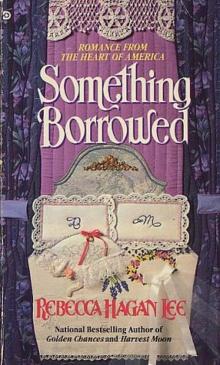 Something Borrowed
Something Borrowed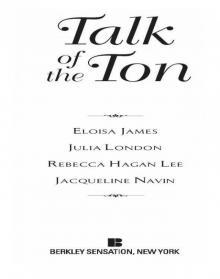 Talk of the Ton
Talk of the Ton Golden Chances
Golden Chances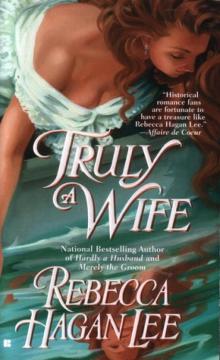 Truly a Wife
Truly a Wife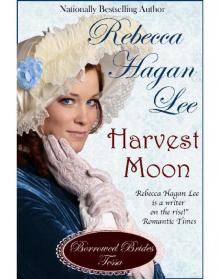 Harvest Moon
Harvest Moon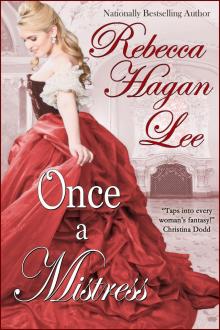 Once a Mistress
Once a Mistress Gossamer
Gossamer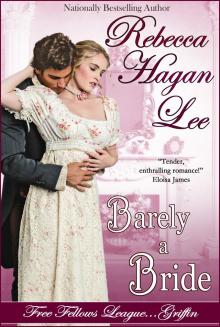 Barely a Bride
Barely a Bride Hardly a Husband
Hardly a Husband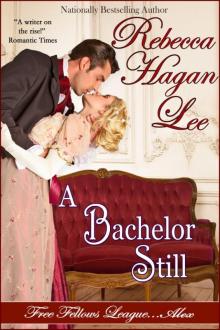 A Bachelor Still
A Bachelor Still A Wanted Man
A Wanted Man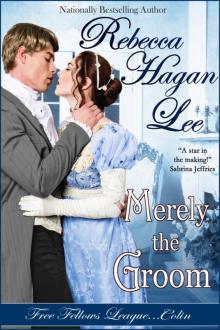 Merely the Groom
Merely the Groom Whisper Always
Whisper Always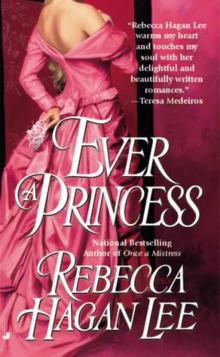 Ever a Princess
Ever a Princess A Hint of Heather
A Hint of Heather